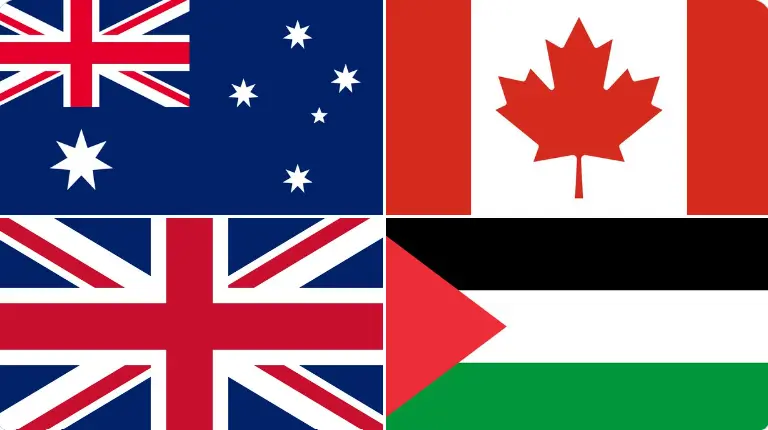
What Canada, UK, Australia, and Portugal’s Palestine Move Means for the World
Palestinian Statehood- What the World Just Did: On September 21, 2025, four powerful voices – Canada, the United Kingdom, Australia, and Portugal made a bold move that could reshape the future of the Middle East. In a coordinated announcement ahead of the United Nations General Assembly, these nations formally recognized the State of Palestine, joining over 150 countries already backing a two-state solution to the decades-long Israel-Palestine conflict.
This decision comes amid rising global frustration over the humanitarian crisis in Gaza, continued Israeli military operations, and stalled peace negotiations. While symbolic in nature, the recognition carries deep diplomatic weight and signals a shift in Western foreign policy away from traditional U.S.-Israel alignment.
Let’s break down this historic moment in simple terms, understand what it means for Palestinians, Israelis, and the world, and explore the reactions and consequences that follow.
Why These Recognitions Matter: A Turning Point in Global Diplomacy
For decades, the question of Palestinian statehood has been a sensitive and polarizing issue. While more than 140 UN member states had already recognized Palestine, none of the G7 nations had taken that step until now.
On September 21:
- Canada became the first G7 country to recognize Palestine, with Prime Minister Mark Carney calling it a step toward a “peaceful future for both the State of Palestine and the State of Israel”.
- UK Prime Minister Keir Starmer emphasized the need to “revive the hope of peace” and acknowledged Britain’s historical role in the region, referencing the Balfour Declaration of 1917.
- Australia’s Prime Minister Anthony Albanese declared recognition of the “independent and sovereign State of Palestine,” aligning with Australia’s long-standing support for a two-state solution.
- Portugal’s Foreign Minister João Gomes Cravinho echoed similar sentiments, stating that recognition is “the fulfilment of a consistent and widely agreed policy”.
These recognitions are not just diplomatic gestures they are statements of intent. They aim to:
- Pressure Israel to halt its offensive in Gaza
- Encourage reforms within the Palestinian Authority
- Exclude Hamas from future governance
- Reignite stalled peace talks
The Two-State Solution: Hope, History, and Hard Realities
The two-state solution envisions an independent State of Palestine coexisting peacefully alongside Israel. It’s been the cornerstone of international peace efforts for decades, but progress has been slow and often reversed.
The recent recognitions aim to:
- Reaffirm global support for Palestinian self-determination
- Push for a ceasefire and humanitarian aid in Gaza
- Encourage democratic reforms within Palestine, including elections by 2026
However, the ground realities remain grim:
- Over 65,000 Palestinians have died in Gaza since the October 7, 2023, attacks
- Israeli strikes continue, with famine and displacement affecting millions
- The West Bank faces increasing pressure from Israeli settlements
Despite these challenges, leaders like Starmer and Carney insist that recognition is not a reward for Hamas, but a step toward peace. They stress that Hamas must be excluded from future governance and held accountable for its actions.
Israel’s Reaction: Condemnation and Diplomatic Fallout
Israeli Prime Minister Benjamin Netanyahu responded with strong condemnation, calling the recognitions a “huge reward to terrorism” following the October 7 attacks by Hamas that killed 1,200 Israelis and led to 251 hostages.
Other Israeli officials echoed this sentiment:
- Foreign Minister Gideon Saar labelled the move “immoral” and “repugnant”
- The Hostage and Missing Families Forum criticized the decision while hostages remain captive
Israel argues that recognizing Palestine at this moment:
- Undermines its security
- Encourages extremist groups
- Ignores the ongoing threat posed by Hamas
The United States also expressed disapproval, maintaining its stance that recognition should come only after direct negotiations between Israel and Palestine. This puts Washington increasingly at odds with its traditional allies.
What Comes Next: UN Assembly, Global Shifts, and the Road Ahead
The timing of these recognitions is no accident. They were announced just before the opening of the 80th United Nations General Assembly, where a special conference on the two-state solution is set to take place.
Key developments to watch:
- France, Belgium, and New Zealand are expected to follow suit soon
- The Palestinian delegation will participate via teleconference after the U.S. denied entry visas
- Discussions will focus on ceasefire, humanitarian aid, and long-term peace frameworks
This wave of recognitions marks a broader shift:
- Western nations are increasingly frustrated with the Gaza war
- Traditional allies of Israel are re-evaluating their positions
- The global community is rallying around the idea that peace requires bold action
For Palestinians, this moment offers hope but also a challenge. Recognition must be followed by internal reforms, unity, and responsible governance. For Israel, it’s a wake-up call to re-engage with peace talks and address international concerns.
A Symbolic Step with Real Consequences
The recognition of Palestine by Canada, the UK, Australia, and Portugal is more than a diplomatic headline, it’s a signal that the world is ready to act. It reflects a growing consensus that peace cannot wait, and that both Palestinians and Israelis deserve security, dignity, and a future.
While the road ahead is uncertain, this moment could be the spark that reignites hope. As the UN Assembly unfolds, the world will be watching and perhaps, just perhaps, history will begin to turn.
Also read: Cork Protests: Anti-Immigration and Pro-Palestine Rallies-Heated Debates
Stay informed with the latest news and updates – only on Rapido Updates.
1 thought on “Palestinian Statehood- What the World Just Did: Canada, UK, Australia, Portugal Recognize Palestine in Historic UN Week Shift”
Comments are closed.